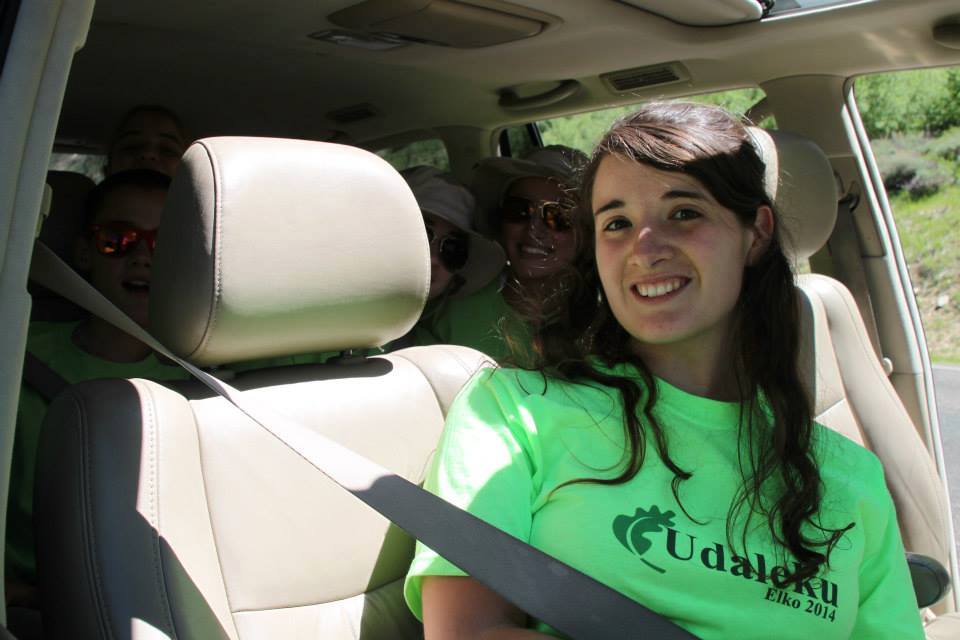basque heritage worldwide

07/09/2014

ADVERTISING
Ander Egiluz Beramendi, USA. Eztitxu Harignordoquy just finished her masters degree in Philology and got the offer to come to the US in February to teach in Bakersfield. Now, her five-month-stay has come to an end and she says "it has been an amazing experience". "It’s been a really beautiful experience," she says.
-What was your task in Bakersfield?
-I had three types of students – the kids from the Basque Club, the adults from the Basque Club, and American students at CSUB. So I had to adjust my classes to the different groups. The adult group from the Club had a good knowledge of the Basque culture but was not up to date with what was going on, currently, in the Basque Country, so I tried to show them that. With the kids I rehearsed some Basque songs for them to sing at the Picnic (celebrated in May), since their parents wanted them to take part in the performance. Singing was our way to approach the language. And at the University I focused more on the cultural part than in the language, because they were interested but at the beginning they didn’t even know where exactly the Basque Country was on the map or that Basque was a language by itself. I had eleven students and my goal was to give them a general overview and spark their interest about aspects of the Basque Country and Culture.
-And at the NABO Udaleku in Elko, Nevada?
-I’ve been the Basque language instructor, along with Anita Franzoia. We had two weeks to teach something to the kids and since they had very different levels it’s been a little bit complicated. We taught them how to introduce themselves and also some songs, with specific vocabulary. For instance, “Aldapeko sagarraren” (“The apple tree at the foot of the mountain”), a song that the older kids already knew but that I discovered in Bakersfield that for some reason kids really like; or “Lehenengo ikasgaia” (“The first lesson”), a good song to learn the verb To Be in Euskara; or “Guk euskaraz” (“We speak in Basque”), for them to be conscious that the future of the Basques, their language and culture includes and needs them.
-What do you feel when you see so many kids learning Basque language and culture, so far away from the Basque Country?
-Great happiness. There were 75 kids and many others didn’t have the chance to come because there were no more positions. All of them want to go to Udaleku, it’s amazing. So I feel great happiness but, also, a little sadness too when I think how many people over there in the Basque Country, for instance in Iparralde don’t care about this. That makes me feel sad.
-You came to the States with the purpose of teaching something but surely you also learned something.
-I’ve learned so many things. I am from Baigorri and in Bakersfield there are a lot of people from that area so I’d heard many things about all this before. Also my father, who is a bertsolari (Hariñordoki’s father is Jean Louis “Laka”), came to sing in Bakersfield six years ago. What amazed me the most has been the solidarity amongst the people here and how warmly they welcome Basque people from Europe. They carry that in their hearts, they want to be Basque. They always say “I am Basque.”
-Has this been your first experience with the Diaspora?
-It’s been my first personal experience with the Diaspora nonetheless my aitatxi (grandfather) was a sheepherder in Wyoming, for five years. And, in the Basque Country, I met people like this American, from San Francisco, that went to Bidarrai and started dancing with the same dance group I used to dance with.
-Would you recommend this experience to your friends?
-Without the slightest doubt, I am aware of how lucky I’ve been. This opportunity fell from the sky. It’s been the best experience of my life. I’ve had a lot of luck and if any of my friends could do it that’d be awesome.
-What plans do you have now that you’re done with your tasks?
-Next week a friend of mine from Senpere will come to visit me and we’ll be travelling around for four weeks − we’ll be visiting California, Nevada, Utah, and Arizona. My visa expires in August so I will have to go back home, but I wish I could stay four more moths, he he!
-And professionally speaking?
-I’m not sure yet but I do enjoy teaching. I’d like to teach Basque in Iparralde. I also like dialectology and sociolinguistics, so I might want to work in that field. I conducted research about the Standard Basque in Iparralde – it was not easy but I enjoyed it. Since Basque is not official in Iparralde there are a lot of things to do.
ADVERTISING
ADVERTISING
ADVERTISING
ADVERTISING
ADVERTISING
© 2014 - 2019 Basque Heritage Elkartea
Bera Bera 73
20009 Donostia / San Sebastián
Tel: (+34) 943 316170
Email: info@euskalkultura.eus